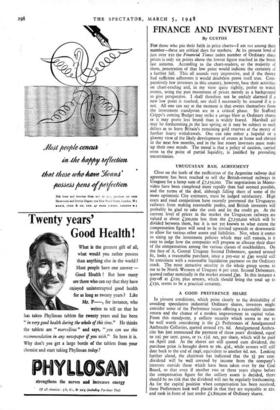FINANCE AND INVESTMENT
By CUSTOS
FOR those who pin their faith in price charts—I am not among their number—these are critical days for markets. At its present level of just over no the Financial Times index number of Ordinary share prices is only six points above the lowest figure reached in the break last autumn. According to the chart-readers, or the majority of them, penetration of that low point would indicate the certainty of a further fall. This all sounds very impressive, and if the theory had sufficient adherents it would doubtless prove itself true. Com- paratively few investors in this country, however, base their activities on chart-reading and, in my view quite rightly, prefer to watch events, using the past movement of prices merely as a background to give perspective. I shall therefore not be unduly alarmed if a new low point is reached, nor shall I necessarily be assured if it is not. All one can say at the moment is that events themselves from the investment standpoint are in a critical phase. Sir Stafford Cripps's coming Budget may strike a savage blow at Ordinary shares or it may prove less brutal than is widely feared. Marshall aid may be forthcoming,in the late spring, or it may be subject to such delays as to leave Britain's remaining gold reserves at the mercy of further heavy withdrawals. One can take either a hopeful or a gloomy view of the likely development of events at home and abroad in the next few months, and in the last resort investors must make up their own minds. The moral is that a policy of caution, carried even to the point of partial liquidity, is justified by prevailing uncertainties.
URUGUAYAN RAIL AGREEMENT
Close on the heels of the ratification of the Argentine railway deal agreement has been reached to sell the British-owned railways in Uruguay for a lump sum of £7,550,000. The negotiations in Monte- video have been completed more rapidly than had seemed possible, and the terms of the deal, although falling short of some of the more optimistic City estimates, must be judged satisfactory. High costs and road competition have recently prevented the Uruguayan railways from making reasonable profits, and British investors will probably be glad to take the cash and let the credit go. At the current level of prices in the market the Uruguayan railways are valued at about L300,000 less than the £7,150,000 which will be divided between them, but it is not yet known to what extent the compensation figure will need to be revised upwards or downwards to allow for various other assets and liabilities. Nor, when it comes to sizing up the investment policies which may still remain, is it easy to judge how the companies will propose to allocate their share of the compensation among the various classes of stockholders. On the face of it, Central Uruguay Second Debenture, quoted around 81, looks, a reasonable purchase, since a pay-out at £90 would still be consistent with a reasonable liquidation payment on the Ordinary stock. The most attractive security in the whole group seems to me to be North Western of Uruguay 6 per cent. Second Debenture, quoted rather nominally in the market around £9o. In this instance a pay-off at Dr°, plus arrears, which should bring the total up to L130, seems to be a practical certainty.
A GOOD PREFERENCE SHARE In present conditions, which point clearly to the desirability of avoiding speculative industrial Ordinary shares, investors might consider some of the Preference issues offering a reasonable income return and the chance of a modest improvement in capital value. From this standpoint, a colliery security which seems to me to be well worth considering is the LI Preferences of Amalgamated Anthracite Collieries, quoted around 17s. 6d. Amalgamated Anthra- cite has just announced the payment of three years' dividend, equal to to} per cent. gross, or Is. lid. net, per share, which will be paid on April 2nd. As the shares are still quoted cum dividend, the purchase price is brought down to 16s. 4fd., while arrears will still date back to the end of 1946, equivalent to another 6d. net. Looking further ahead, the chairman has indicated that the 31 per cent. dividend will be well covered by income firom the company's interests outside those which have been taken over by the Coal Board, so that even if another two or three years elapse before the compensation figure for the colliery assets is decided, there should be no risk that the dividend will not be regularly forthcoming. As for the capital position when compensation has been received, these Preferences look well placed in that they are repayable at 22S. and rank in front of just under £1,800,000 of Ordinary shares.






























 Previous page
Previous page